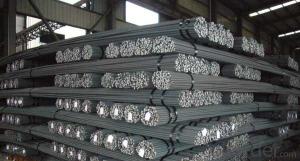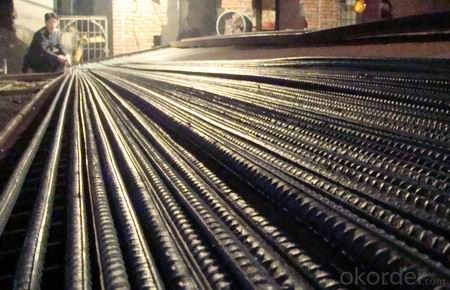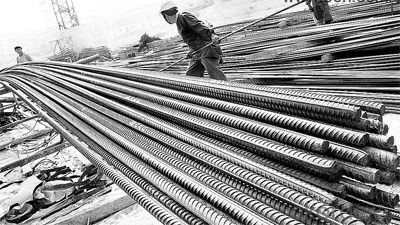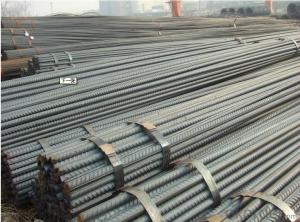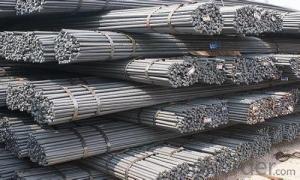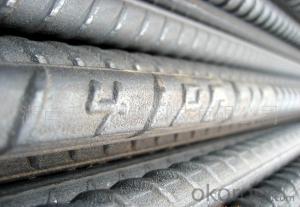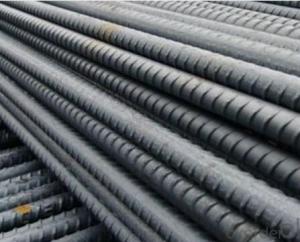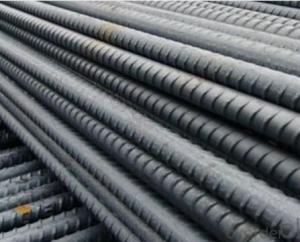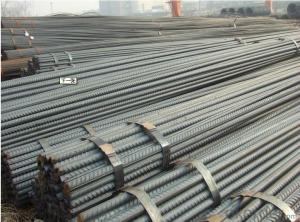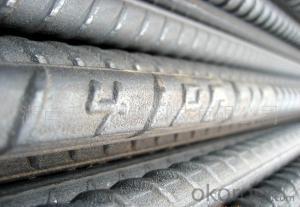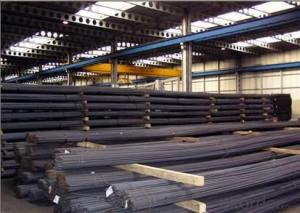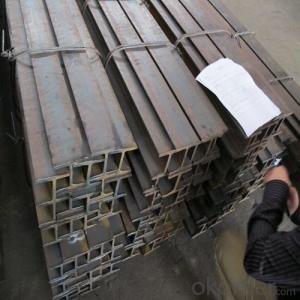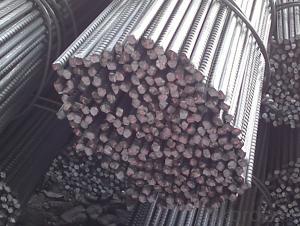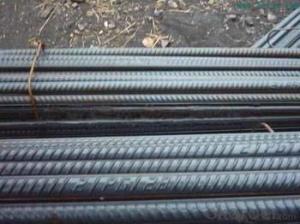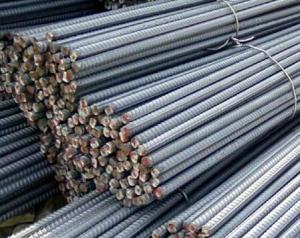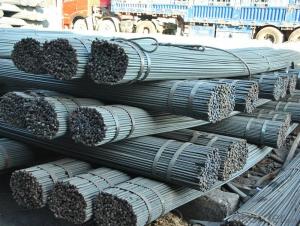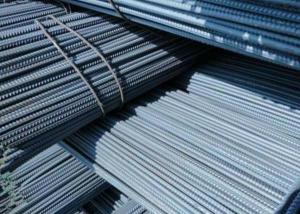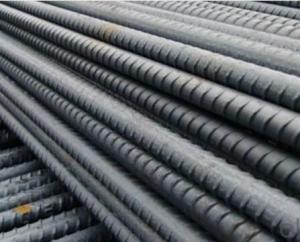A615 deformed steel bar deformed steel bar
- Loading Port:
- Tianjin
- Payment Terms:
- TT or LC
- Min Order Qty:
- 25 m.t.
- Supply Capability:
- 100000 m.t./month
OKorder Service Pledge
OKorder Financial Service
You Might Also Like
Product Description:
OKorder is offering high quality Hot Rolled Steel I-Beams at great prices with worldwide shipping. Our supplier is a world-class manufacturer of steel, with our products utilized the world over. OKorder annually supplies products to European, North American and Asian markets. We provide quotations within 24 hours of receiving an inquiry and guarantee competitive prices.
Product Applications:
Hot Rolled Steel I-Beams are ideal for structural applications and are widely used in the construction of buildings and bridges, and the manufacturing, petrochemical, and transportation industries.
Product Advantages:
OKorder's Steel I-Beams are durable, strong, and resist corrosion.
Main Product Features:
· Premium quality
· Prompt delivery & seaworthy packing (30 days after receiving deposit)
· Corrosion resistance
· Can be recycled and reused
· Mill test certification
· Professional Service
· Competitive pricing
Product Specifications:
Packaging & Delivery
| Packaging Detail: | In bundles (standard export package or as per clients' requirement) |
| Delivery Detail: | According to the actual order quantity |
Specifications
Standard: ASTM, GB, JIS, BS, AISI
Grade: HRB400, HRB335
Application: Construction, shipping, building material
Product Description
Type | steel rebar |
Standard Grade | a. GB1499.2-2007, HRB335, HRB400, etc. |
b. ASTM A615 Gr.40, Gr.60, etc. | |
c. BS4449, etc. d. JISG3112-SD390 | |
Diameter | 6mm-32mm etc. as per customers' requirement |
Length | 6m, 8m, 9m,12m as standard |
Application | Construction, shipping, building material |
Packing | standard export packing, or as per customers' requirement |
Quality | First quality |
Delivery time | Right now after the deposit. |
Others | 1. our products conform to all the standards |
2. we can offer special specification products as per our customers | |
3. we can offer the original mill test certificate and original product |
1.Diameter:6mm-32mm
2.Material:BS4449 Grade 460B,ASTM A615 GR60
3.Length:6-12meters
1. Length: 6m-12m as standard.
2. Reputation first, best competitive price, high quality, quotes price promptly and confirm the delivery on time!
3. Application : Used for housing construction.
4. PRICE: Keep lower operating costs so as to offer competitive price for our clients.
5. Minimum Order Quantity: 300 MTS as per size.
6. Invoicing: Actual or Theoretical Weight Basis as buyer’s request.
7. Payment terms: TT payment in advance or irrevocable LC at sight.
8. Delivery time: 25-30 days after we receive your TT payment at sight
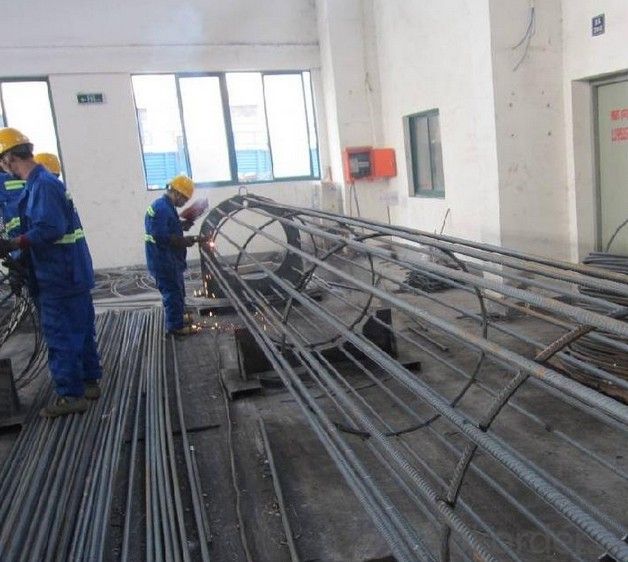
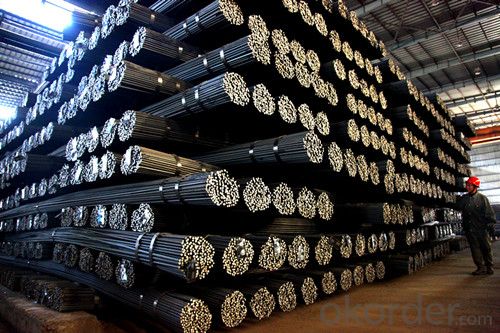
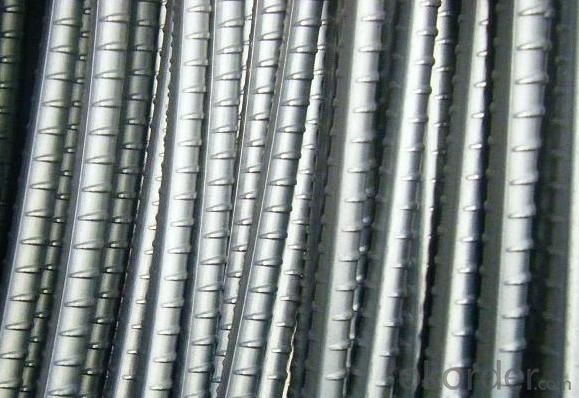
FAQ:
Q1: How do we guarantee the quality of our products?
A1: We have established an advanced quality management system which conducts strict quality tests at every step, from raw materials to the final product. At the same time, we provide extensive follow-up service assurances as required.
Q2: What makes stainless steel stainless?
A2: Stainless steel must contain at least 10.5 % chromium. It is this element that reacts with the oxygen in the air to form a complex chrome-oxide surface layer that is invisible but strong enough to prevent further oxygen from "staining" (rusting) the surface. Higher levels of chromium and the addition of other alloying elements such as nickel and molybdenum enhance this surface layer and improve the corrosion resistance of the stainless material.
- Q: What are the factors that can cause steel rebars to corrode prematurely?
- Premature corrosion of steel rebars can be influenced by various factors. Some of these include: 1. Moisture exposure: The presence of moisture is a primary catalyst for rebar corrosion. Prolonged exposure to water or high humidity levels can lead to rust or oxidation on the rebar surface. 2. Chloride ions: The corrosion process of steel rebars can be accelerated by chloride ions, commonly found in seawater or de-icing salts. These ions can enter the concrete cover and come into contact with the rebar, causing faster corrosion. 3. Carbonation of concrete: Concrete carbonation occurs when atmospheric carbon dioxide reacts with the alkaline components of concrete. This process reduces pH levels, diminishing the concrete cover's ability to passivate and increasing the likelihood of rebar corrosion. 4. Inadequate concrete cover: Insufficient concrete cover exposes rebars to external elements like moisture and chloride ions, leading to accelerated corrosion. Poor construction practices or inadequate design specifications can result in insufficient cover. 5. Poor concrete quality: Low-quality concrete used in construction may contain impurities or lack proper curing, making the concrete more permeable. This allows harmful substances like moisture and chlorides to penetrate easily, causing premature rebar corrosion. 6. Galvanic corrosion: Galvanic corrosion occurs when dissimilar metals come into contact in the presence of an electrolyte, such as moisture. For instance, if steel rebars come in contact with aluminum or copper materials, galvanic corrosion can occur. 7. Construction defects: Issues during the construction phase, such as inadequate workmanship or insufficient protective measures, can contribute to premature rebar corrosion. Examples include poor concrete compaction, improper reinforcement placement, or inadequate waterproofing. To prevent premature corrosion of steel rebars, it is essential to use high-quality materials, ensure adequate concrete cover, apply corrosion-resistant coatings or inhibitors, and employ appropriate construction practices. Regular inspections and maintenance can also help identify and address potential corrosion issues before they worsen.
- Q: What are the factors that determine the selection of steel rebars?
- The factors that determine the selection of steel rebars include the required strength and durability, the specific application and load requirements, the environmental conditions such as exposure to corrosion or high temperatures, the cost-effectiveness, and compliance with relevant building codes and regulations.
- Q: Can steel rebars be used in the construction of swimming pools?
- Yes, steel rebars can be used in the construction of swimming pools. Steel rebars provide reinforcement and strength to the concrete used in swimming pool construction, ensuring its durability and longevity.
- Q: What is the quality difference between round bar and screw steel?
- Physical and mechanical properties are different. Because of the different chemical composition and strength of reinforcing steel, they are different in physical and mechanical properties. The cold bending property of steel is good, can make the hook 180, screw steel can only make straight hook 90 degrees; steel weldability is good, with ordinary carbon steel electrode can be used to low alloy electrode; anti fatigue performance and toughness in steel bar is good.
- Q: Can steel rebars be used in pedestrian bridge construction?
- Yes, steel rebars can be used in pedestrian bridge construction. Steel rebars are commonly used as reinforcement in concrete structures, including bridges. They enhance the structural integrity and strength of the bridge, ensuring its ability to withstand various loads and forces. Steel rebars provide the necessary reinforcement to resist tension, bending, and shear forces, making them an ideal choice for pedestrian bridge construction. Additionally, steel rebars have excellent durability, corrosion resistance, and are readily available, making them a cost-effective and reliable option for bridge construction.
- Q: How are steel rebars tested for tensile strength?
- Steel rebars are tested for tensile strength by subjecting them to a controlled force in a testing machine. This machine applies an increasing load to the rebar until it fractures. The maximum force applied to the rebar before it breaks is then recorded as the tensile strength.
- Q: How do steel rebars affect the overall vibration resistance of a structure?
- Steel rebars can significantly enhance the overall vibration resistance of a structure. By providing additional strength and stiffness, rebars increase the structural integrity and help to distribute and dissipate vibrational energy. This reinforcement effectively reduces the magnitude of vibrations and minimizes the risk of structural damage or failure during dynamic events, such as earthquakes or high winds.
- Q: What is the typical weight per meter of a steel rebar?
- The typical weight per meter of a steel rebar can vary depending on the diameter and thickness of the rebar. However, on average, a steel rebar weighs around 0.75 kilograms per meter.
- Q: Can steel rebars be used in dam construction projects?
- Yes, steel rebars can definitely be used in dam construction projects. Steel rebars are commonly used in the construction industry for reinforcing concrete structures, and dams are no exception. The rebars are embedded into the concrete to enhance its tensile strength, making it more resistant to cracking and structural failure. Dams, which are massive structures designed to hold back water, require a high level of strength and durability to withstand the immense forces and pressures exerted by the water. Steel rebars provide the necessary reinforcement to ensure the structural integrity of the dam. Additionally, steel rebars are corrosion-resistant, which is crucial in dam construction, where exposure to water is constant. Overall, the use of steel rebars in dam construction projects is a well-established and essential practice.
- Q: What are the different types of steel rebars used in road construction?
- There are several types of steel rebars used in road construction, each with its own specific characteristics and advantages. Some of the commonly used types include: 1. Mild Steel Rebars: Also known as carbon steel rebars, these are the most commonly used type in road construction. They have a low carbon content and are relatively inexpensive. Mild steel rebars are suitable for general-purpose applications and provide good strength and ductility. 2. High Strength Deformed (HSD) Rebars: These rebars have higher tensile strength compared to mild steel rebars. They are manufactured by subjecting mild steel bars to mechanical treatments, such as hot rolling, quenching, and tempering. HSD rebars are used in areas where higher load-bearing capacity is required, such as bridge construction. 3. Stainless Steel Rebars: These rebars are corrosion-resistant due to their high chromium content. They are especially beneficial in areas with high humidity, coastal regions, or where road construction is exposed to corrosive substances. Stainless steel rebars are more expensive than other types but offer long-term durability. 4. Epoxy-Coated Rebars: These rebars are coated with epoxy to provide protection against corrosion. Epoxy coating acts as a barrier between the steel surface and the environment, preventing the penetration of moisture and corrosive elements. Epoxy-coated rebars are commonly used in concrete pavements to enhance the longevity of the road. 5. Galvanized Rebars: These rebars are coated with a layer of zinc to protect against corrosion. The zinc coating acts as a sacrificial layer, preventing the steel from coming into contact with corrosive elements. Galvanized rebars are commonly used in road construction projects where corrosion resistance is crucial, such as in areas with high levels of moisture or chemical exposure. It is important to select the appropriate type of steel rebars based on the specific requirements of the road construction project. Factors such as load-bearing capacity, environmental conditions, and budget considerations play a significant role in determining the most suitable type of rebar to be used.
Send your message to us
A615 deformed steel bar deformed steel bar
- Loading Port:
- Tianjin
- Payment Terms:
- TT or LC
- Min Order Qty:
- 25 m.t.
- Supply Capability:
- 100000 m.t./month
OKorder Service Pledge
OKorder Financial Service
Similar products
Hot products
Hot Searches
Related keywords
